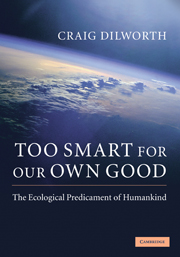Book contents
- Frontmatter
- Contents
- List of figures and tables
- Preface
- Introduction
- 1 Scientific ground rules
- 2 The new views in anthropology, archaeology and economics
- 3 Theoretical background to the vicious circle principle
- 4 The vicious circle principle of the development of humankind
- 5 The development of humankind
- 6 The vicious circle today
- 7 … and too dumb to change
- Conclusion
- Glossary
- Notes
- References
- Index
1 - Scientific ground rules
Published online by Cambridge University Press: 25 January 2011
- Frontmatter
- Contents
- List of figures and tables
- Preface
- Introduction
- 1 Scientific ground rules
- 2 The new views in anthropology, archaeology and economics
- 3 Theoretical background to the vicious circle principle
- 4 The vicious circle principle of the development of humankind
- 5 The development of humankind
- 6 The vicious circle today
- 7 … and too dumb to change
- Conclusion
- Glossary
- Notes
- References
- Index
Summary
Principles of physics, chemistry and biology
Any attempt to explain a particular phenomenon – in the present case the development of humankind – must rest on certain principles. These are the basic presuppositions underlying the explanation; and they must be accepted as correct by those to whom the explanation is directed. The presuppositions on which the theory to be presented here are based are central principles of modern science, each of which states something about the nature of reality as it is assumed to be in science and, thus, as it ought to be assumed to be generally. The relevant sciences include physics, chemistry, biology and ecology – as well as human ecology, the core of which is here suggested to be the vicious circle principle. In what follows I shall present the relevant principles explicitly, marking them with Roman numerals, it generally being the case that each principle presupposes others with a smaller number.
The most important principle of physics is:
I. The principle of the conservation of energy
This principle was first put forward by R. J. Mayer in 1842. It is also known as the first law of thermodynamics. It states that:
Quantity of energy is constant.
Thus energy can be neither created nor destroyed, but only transformed.
Another physical principle of consequence to the development of humankind is:
II. The principle of the equivalence of mass and energy
This principle has been expressed in the form of the equation:
E = mc2
– energy equals mass times the speed of light squared.
- Type
- Chapter
- Information
- Too Smart for our Own GoodThe Ecological Predicament of Humankind, pp. 3 - 49Publisher: Cambridge University PressPrint publication year: 2009

